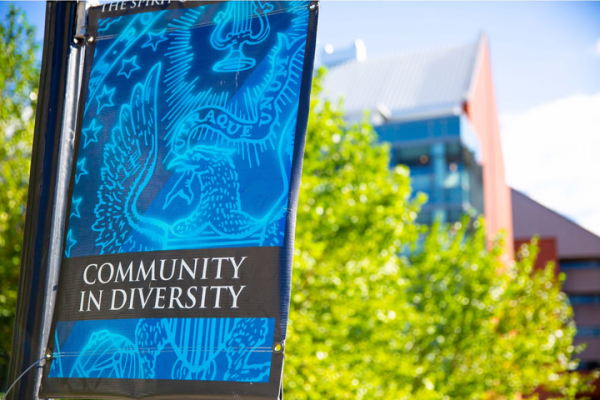As the federal government threatens diversity, equity and inclusion (DEI) initiatives at higher education institutions, Georgetown University faculty and students reaffirmed the importance of “Race, Power and Justice at Georgetown” (RPJ), a required course for first-years centered on injustice and equity at Georgetown.
President Donald Trump’s administration has called on universities to end programs that focus on DEI, alleging DEI initiatives constitute racial discrimination and threatening to pull federal funding from noncompliant institutions. The U.S. Department of Education recently announced investigations into 52 institutions, including Georgetown, to evaluate such programs.

Georgetown inaugurated RPJ, which is the only mandatory course for all undergraduate students beginning with the Class of 2028, for the 2024-25 academic year after a four-year development process that included student input and faculty committees. The one-credit, six-week class consists of a weekly lecture and a professor-led discussion section that cover Georgetown’s legacy of enslavement, issues of workers’ rights and activism for racial justice.
Shareen Joshi, a professor of global development who helped design RPJ, said dismissing the course as a DEI program is reductive and added that the curriculum is deeply rooted in Georgetown’s Jesuit values of service and diversity.
“What we are doing is we are implementing an academic framework, and we’re bringing professors from lots of different disciplines who look at the world differently,” Joshi told The Hoya. “We don’t just have some one prism of ‘DEI’ that we look at the world through.”
“Georgetown’s espoused values are to teach about moral virtue — it was in the opening of the proposal in 1789,” Joshi added. “That’s who we are. It’s in our DNA.”
Adam Rothman, a professor of history who spearheaded RPJ’s creation, said while he is not concerned that federal anti-DEI efforts will bring about an end to RPJ, he worries they may have a chilling effect on class discussions.
“I think a lot of people are justifiably scared about their freedom to teach, freedom to learn and freedom to speak on campus,” Rothman told The Hoya. “With a class like ‘Race, Power and Justice at Georgetown’ those are very real issues.”
“These things are not just academic or theoretical issues anymore, which is a frightening place to be,” Rothman added.
Georgetown has already faced pushback on its DEI policies from Ed Martin, the Trump-appointed U.S. Attorney for the District of Columbia, who announced he would restrict internship and hiring opportunities for Georgetown University Law Center graduates over the law school’s DEI efforts. GULC Dean William Treanor pushed back, citing educational and religious freedom.
Joshi said she invites disagreement in her discussion sections and recognizes some students will have doubts about aspects of the class.
“I want to teach to that student and say, ‘Look, maybe you’re a skeptic, fine, be a skeptic — that’s actually really good because society is polarized and we need dialogue, but that’s all the more reason you need to be here and have this conversation,’” Joshi said.
Across its six weeks, RPJ includes discussions on reparations, labor rights and incarceration which aim to invite students to consider Georgetown’s relationship with injustice and path to equity.
Matthew Lewis (SFS ’28) said while he is open to reexamining the utility of some DEI initiatives, he appreciates the mission of RPJ and found the class impactful.
“RPJ is important for me in that, despite not everything connecting with me, it does have something for everyone,” Lewis wrote to The Hoya. “It’s necessary at a college such as Georgetown to express the voices of its diverse foundation and cohort, and RPJ is one of the few cases where everyone is exposed to a part of our community they may have otherwise not taken the time to look into.”
“The importance of DEI is in understanding the past and our history, meaning that in my opinion its role in Georgetown’s RPJ course as a lens to view our historic mistakes with slavery, for example, is necessary to keep and to understand,” Lewis added.
Sam McVey (MSB ’28) said he believes RPJ’s themes are important, though the brief course may fall short in realizing them.
“I think it needs to provide a clearer vision at the outset in terms of what, exactly, it wants to confront and how these topics all tie together,” McVey wrote to The Hoya. “I think a narrower focus is needed, because just talking vaguely about race for two months can feel more performative than anything, even if the motives behind RPJ are good.”
Professors from every undergraduate school signed up to teach over approximately 20 discussion sections, designed to incorporate a diverse array of perspectives.
Felicitas Opwis, a professor of Islamic studies who teaches a discussion session of RPJ, said that while making RPJ a requirement can feel somewhat performative, the class still has the capacity to change students in important ways throughout the semester.
“Some will never take much out of it, but I would say for two-thirds of the class, it’s actually making a difference,” Opwis told The Hoya. “It’s a mixture — learning and teaching is also performative to some extent.”
“There was much more awareness of differences among people about injustices and structural injustices and how they are our responsibility to deal with them as human beings, as members of society,” Opwis added.
Amanda Pinheiro, a School of Foreign Service professor studying international migration and leading an RPJ discussion section, said she believes the RPJ course may add nuance to students’ perception of the world.
“I cannot say those 50 minutes weekly will shape the way you see race, power and justice in the world, but I think you will take that with you,” Pinheiro said. “You’re going to see life differently. I don’t know how exactly, but I don’t believe that you can actually ignore what you learned. It’s going to be there in the back of your mind.”
Joshi said she feels the course’s purpose goes beyond diversity but rather teaches students how to think about complex problems.
“If we can help you make sense of where you are, why it looks the way it is, what are the tensions, what are the debates, what are the fault lines, what are the mistakes — if you can start making sense of that in this microcosm of Georgetown, you become a very thoughtful person when you walk out into the world,” Joshi said.








